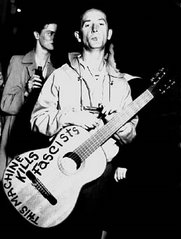
As much as I herald the atypical and the aformulaic in the world of cinema there are certain films that must be appreciated for their classical form, executed to perfection. Ken Burns represents a filmmaker who makes films of this nature. Every series that Burns has produced I have seen some (if not the majority) of and enjoyed. When I heard his next topic was World War II I can't say that I was overwhelmed with excitement. I mean since the War itself the popular media stage has been inundated with films and TV and books and news and articles about "The Great War." (not a sarcastic use of quotation)
But, my devotion to Burns overcame. And, I must say, he has not disappointed.
The primary reason it is a success, I feel, is his focus on the personal stories that are told by the people who lived through the war. All his films do this to a degree: Instead of the authoritative, omniscient narrartor giving the history of the war and the history of the politics and the history of the culture, he lets the simple, but powerful, first-hand stories paint a mural of life during WWII. He has siblings read the letters of their borhter who died in Italy during Patton's surge. He has readings from diaries and other written correspondence between people. And, in these moments of his films it hits me. The relation of peoples stories does so much to heal, it does so much to illeviate the struggle, if only people hear their story a person can find the motivation to keep fighting.
My mind wandered to a relationship I recently created with a couple whose son is on death row. Their life, since 1996 when their son was sentenced to death, has been about making people aware of the story of their son's conviction and the folly that it was. I haven't talked to them in nearly four months and the thought crossed my mind that maybe Eric, their son, had been given a date for execution and nobody knows about it, and how alone you must feel to experience such sorrow and have no one to share it with. I expected that they would never want to talk to a stranger about the situation, the going has been tough and why would they have someone they do not know into their home and into their life? Yet, they did. Perhaps, because they need people to hear their story. For, they believe (as do I) if only more people could hear their son's story more people would come to the conclusion that they did and that I did that he was wrongly convicted. And, maybe something could be done to stop his impending death. Moreover, and more fundamentally, them telling his story helps to take the weight of their grief and spread it over the shoulders of all the willing listeners.
Anticipating some backlash (from all 3 of my readers) I want to say that my aim is not to disrespect war heroes in comparing them to a convicted felon. My comparison is not between Eric and veterans of World War II, my comparison is between the people affected by the war and the parents affected by having their son wrongly sentenced to death, and how both these parties find solace, however minor, in the mere telling of their story.



1 comment:
No backlash here. I think that narratives are powerful and therapuetic for many (including those who just listen to the stories).
We've been watching this newest series as well. The storeis really do give life to a conflict that seems so unreal. Additionally, I am drawn to Burns ability to give life to photos and stills. I love the zooming and moving he does while showing photographs. I really feel I am emerged in the scene. It is that connection that makes the scene seem so "real."
Post a Comment